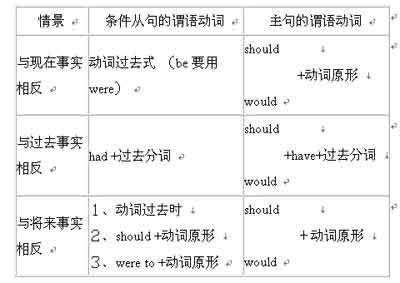英语谓语的三种语气
英语的谓语有三种语气:祈使语气、陈述语气和虚拟语气。
一、祈使语气
祈使语气主要用于祈使句中,表示:“祈求、命令、吩咐、祝愿等”意思,主语是第二人称时省去主语,谓语动词不变形。例如:
Come over here. 过来。
Long live the people! 人民万岁!
God bless me! 上帝保佑我!
Wish you success. 祝你成功!
二、 陈述语气
陈述语气用于陈述事实的句子中,也是英语中用得最多的句子,谓语动词有各种变化。例如:
That sounds a good idea.听起来不错。
Li Ming’s sisters learned English in Canada. 李明的姐姐们曾在加拿大学过英语。
The children are playingoutside.孩子们正在外面玩。
This will be discussed nexttime.这个问题将在下次讨论。
The whale has died.那条鲸已死。
Was he born in Australia in 1998?他是于1998年生于澳大利亚吗?
Only in this way are they able to get the bestresult. 只有用这种方法他们才能取得最好的结果。
Anny hasn’t (has not) anything to do withthis matter. 安丽于那事无关。
三、 虚拟语气
在英语中,用虚拟语气表示假设或说话人的主观愿望,其谓语动词有其特定的表现形式。主要分为以下几种。
1、条件句中的虚拟语气
在条件句中,用虚拟语气表示与事实相反的纯然假设,又分为以下三种情况:
1)、与将来事实相反的虚拟语气,条件状语从句用过去时态“did/were或用wereto do/should do”,主句用情态动词的过去时形式加原形动词“would/should/could/mightdo”的形式。例如:翻译“假如明天我去开会,我会告诉他的。”这句话,可用下列三种形式。
If I went to the meeting tomorrow, /If I were togo to the meeting tomorrow,/ If I should go to themeeting tomorrow, I would tell him about it.“should”表示可能性很小。
2)、与现在事实相反的虚拟语气,条件状语从句只用过去时态“did/were”,主句用情态动词的过去时形式加原形动词“would/should/could/mightdo”的形式。例如:
If you didn’t go now, you could not have thetime to go there. 如果你现在不去你, 就不可能有时间去了。
If I were rich, I would buy a plane.如果我现在有钱,我会卖一架飞机的。
3)、与过去事实相反的虚拟语气,条件状语从句只用过去完成时态“haddone”,主句用情态动词的过去时形式加完成时动词“would/should/could/might havedone”的形式。例如:
If you had been late yesterday, the teacher wouldhave criticized you. 如果昨天你迟到,老师会批评你的。
Would you have refused him if he had told you aboutit at that time? 假如他当时就告诉你了,你会拒绝吗?
如果“If”条件句中有:系动词“were”、助动词“had”或情态动词“should”,连词“If”还可以省去,并把这三类动词提到主语前,构成倒装句。例如:
Were I a bird, I would fly across theAtlantic.如果我是一直鸟,我就会飞过大西洋。
Should I go to the meeting tomorrow, I would tellhim about it.万一我明天去开会,我会把情况告诉他的。
Had you been late yesterday, the teacher would havecriticized you.如果你昨天迟到了,老师会批评你的。
2、谓语动词不变形的虚拟语气
在英语中,表示主观愿望的“坚持要: resist(resistance);“命令:order(n./v.),command(n./v.)”;“建议:advise (advice), suggest (suggestion),recommend(recommendation)”;“要求:ask; demand (n./v.), request (n./v.), require(requirement)” etc.”的名词性从句要用虚拟语气,谓语用动词原形或情态动词“should”加动词原形,或称之为:“不变形的虚拟语气”。可巧记为:一个坚持,两道命令、三条建议、四项要求。如:
It was my suggestion that he (should) go to BeijingUniversity.他上北京大学是我的建议。(主语从句)
I shall suggest that he (should) go to BeijingUniversity. 我将建议他上北京大学。(宾语从句)
My suggestion is that he (should) go to BeijingUniversity. 我的建议是他上北京大学。(表语从句)
My suggestion that he (should) go to BeijingUniversity is reasonable. 我叫他上北京大学的建议是有道理的。(同谓语从句)
另外,在主语从句中,如果表语是:“important, natural, necessary, strange,better,best,suggested,desired, requested, required, etc. ”, 也用这种虚拟语气,如:
It is necessary that she (should) pass the drivingtest. 她必须通过驾照考试。
It will be better/best that they (should) meet someother time. 他们最好改日再见面。
It is required that we (should) arrive at therailway station at 7:00 am. 要求我们7点钟到达火车站。
3、特殊句型中的虚拟语气
1)、It is (high) time that we went to bed.我们该去睡觉了。
2)、I would rather you had left the packages in thecar. 我到宁愿你当时把包裹留在车上。
3)、I had rather Jack told you than I did.我宁愿杰克告诉你,而不是我。
4)、I wish that Tom could help me now.要是汤姆现在能帮一下我就好了。
5)、We have loved her as if/though she were our owndaughter. 我们一直把她当成自己的亲生女儿去爱。
6)、It seems as if/though she knew thenews.她好像知道了这个消息。
7)、Would you mind turning on the light!请你把开灯,好吗!
8)、Long live world peace! 世界和平万岁!
9)、It would be a shame to stop the work halfway.半途而废就太遗憾了。
10)、If I could only come (=I wish I could come)!但愿我能来!
4、虚拟语气的其他情况

1)、在英语中,介词“with, without, but for”或副词otherwise也常用来表示虚拟条件句,例如:
With a more responsible doctor, the child would not havedied. 要是换了一个更负责任的医生,那个孩子就不会死。
Without Mr. Smith’s help, we could not have made such greatprogress. 如果没有史密斯的帮助,我们不可能取得这么大的进步。
But for their arrival in time, we might have given itup. 要不是他们及时赶到,我们或许会放弃。
Start at six. Otherwise, you would miss the trainbecause it leaves at seven. 六点钟动身,要不然你们会赶不上火车的,因为火车七点钟离站。
2)、在口语中,还可以省去主句或从句,如:
If he had been here then! 要是他当时在这儿就好了!(省主句)
That would be fine. (如果……),那就好了。(省从句)
3)、虚拟语气的主从复合句的时态有时也可以不一致。
If you had come yesterday, I would not telephone younow. 如果你昨天来了,我现在就不会给你打电话了。
If we arranged the work well today, we could complete iteasily tomorrow. 我们今天就把工作安排好,明天我们会很轻松的。
 爱华网
爱华网

